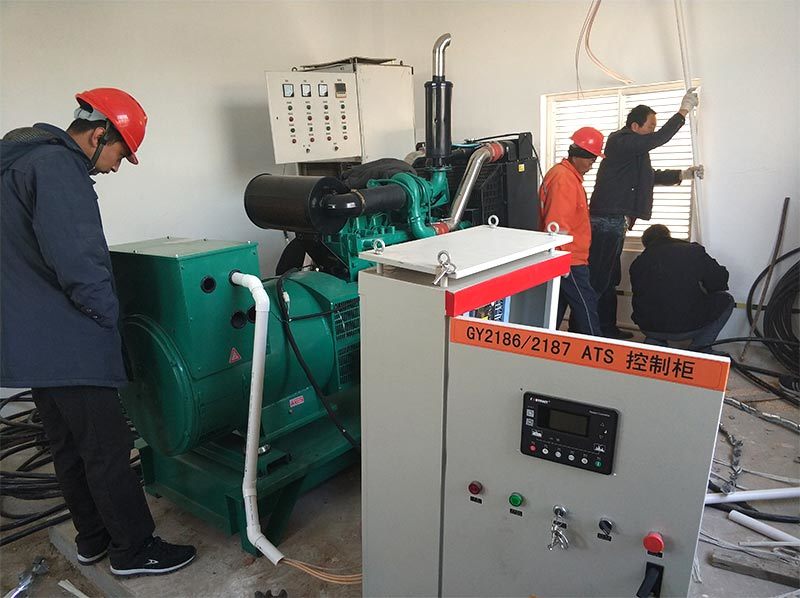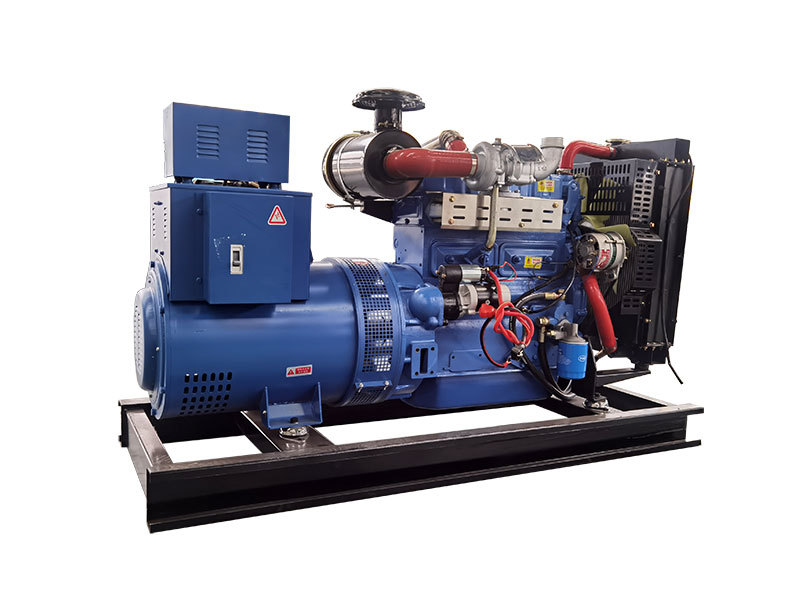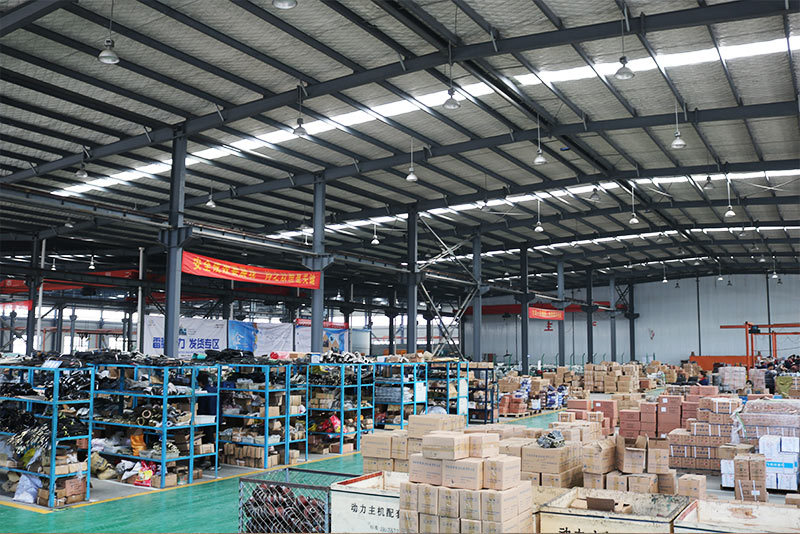Beyond the Blackout: How a Generator Set Can Safeguard Your Business Continuity
In an increasingly interconnected and digitized world, the reliability of power is no longer just a convenience; it's the lifeblood of modern commerce. From small retail outlets to sprawling industrial complexes, virtually every business relies on a consistent supply of electricity to operate. Yet, the threat of power outages—whether due to severe weather, aging infrastructure, or unexpected grid failures—looms larger than ever. To be honest, these disruptions can range from minor inconveniences to catastrophic events, capable of halting operations, eroding customer trust, and inflicting significant financial damage. This is precisely why the concept of business continuity has ascended to the forefront of strategic planning for forward-thinking organizations. It’s about ensuring your operations persist, no matter what challenges arise. And interestingly enough, at the heart of a robust business continuity plan, particularly concerning power, lies a critical piece of equipment: the generator set.
Moving beyond the blackout means shifting from a reactive stance—scrambling to recover after a power loss—to a proactive one, where uninterrupted operation is a given. This article will delve into how a generator set is not merely a backup power source but a fundamental component in safeguarding your business continuity, transforming potential disaster into a minor hiccup.
The True Cost of Downtime: Beyond the Obvious Blackout Impact
When the lights go out, the immediate thought might be the inconvenience. However, for a business, the implications run far deeper than a temporary pause. The financial ramifications alone can be staggering. Lost sales are just the tip of the iceberg; consider the cost of idle employees, damaged inventory due to refrigeration failures, or the potential for data corruption and loss if critical systems shut down abruptly. Many experts agree that the average cost of downtime for businesses can range from hundreds to tens of thousands of dollars per hour, depending on the industry and scale of operations. Can your business truly afford to be offline for even a few hours?
Beyond direct financial hits, the impact on a company's reputation and customer relationships is often more insidious and long-lasting. If customers cannot access your services, make purchases, or get support during an outage, they are likely to turn to competitors. This erosion of trust can be incredibly difficult to rebuild. Furthermore, operational disruptions can cascade through your supply chain, leading to missed deadlines, contractual penalties, and a general loss of productivity that can take days, if not weeks, to recover from. In my experience, the true cost of a power outage is rarely fully appreciated until it's too late, encompassing not just immediate losses but also long-term damage to market position and brand equity. It’s worth noting that even a brief flicker can disrupt sensitive electronic equipment, leading to costly repairs or replacements.

Financial Hemorrhage and Operational Paralysis
Every minute of downtime translates directly into lost revenue opportunities. For a retail business, it means no transactions can be processed. For a manufacturing plant, production grinds to a halt. Service-based companies lose billable hours. Beyond the immediate revenue loss, there are often secondary costs such as overtime pay to catch up, expedited shipping fees for delayed orders, and potential penalties for failing to meet service level agreements (SLAs). The operational paralysis extends to communication systems, security infrastructure, and even basic amenities, rendering the workplace unusable and potentially unsafe.
Reputational Damage and Customer Exodus
In today's competitive landscape, customer loyalty is a fragile commodity. A business that frequently experiences outages or cannot provide reliable service during a power disruption will quickly lose favor. Customers expect seamless experiences, and any deviation from that expectation can lead them to seek alternatives. Social media amplifies negative experiences, turning a localized outage into a public relations crisis. Safeguarding your business continuity is therefore intrinsically linked to maintaining customer trust and a positive brand image.
The Generator Set as Your Business Continuity Cornerstone
This is where the generator set steps in, transforming from a mere emergency device into a strategic asset for safeguarding your business continuity. A well-chosen and properly maintained generator ensures that when the utility power fails, your critical operations can continue without interruption. This seamless transition is facilitated by an automatic transfer switch (ATS), which detects power loss and signals the generator to start, then switches your facility's power supply from the grid to the generator, all within seconds. This rapid response is crucial for preventing data loss, maintaining essential services, and keeping employees productive.
Think about the critical systems that power your business: servers, point-of-sale (POS) systems, security cameras, refrigeration units, communication networks, and HVAC systems. Without a generator, these systems would go dark, leading to the financial and reputational damages discussed earlier. With a generator set, these vital components remain online, allowing your business to continue serving customers, processing transactions, and maintaining a secure environment. It allows you to move truly beyond the blackout, viewing it not as an insurmountable obstacle but as a momentary blip.
Seamless Power Transition and System Protection
The primary function of a generator set in business continuity is to provide an immediate, reliable power supply. This rapid transition minimizes downtime and protects sensitive electronic equipment from damaging power fluctuations that can occur during grid instability or sudden outages. By ensuring a stable power source, a generator set acts as a shield, preserving your IT infrastructure, data integrity, and operational flow.
Maintaining Productivity and Service Delivery
With a generator set in place, your employees can continue their work, production lines can keep running, and customer service can remain uninterrupted. This is vital for maintaining productivity, meeting deadlines, and upholding service level agreements. For businesses that rely on refrigeration, such as restaurants or pharmaceutical companies, a generator prevents spoilage and ensures product integrity, directly impacting profitability and regulatory compliance. It's about ensuring that your business doesn't just survive an outage, but thrives through it.

Key Considerations for Implementing a Robust Generator Solution
Implementing a generator set isn't a one-size-fits-all endeavor; it requires careful planning and consideration to truly safeguard your business continuity. The effectiveness of your solution hinges on several critical factors, from selecting the right size and fuel type to ensuring proper installation and ongoing maintenance. In my experience, a thorough assessment upfront saves significant headaches and costs down the line.
First, sizing the generator correctly is paramount. This involves a detailed load assessment of your facility to determine exactly how much power you need to back up. Do you need to power your entire operation, or just critical systems? Over-sizing can lead to inefficient operation and higher fuel costs, while under-sizing means you won't have enough power when you need it most. It's worth noting that future expansion plans should also be factored into this assessment.
Next, consider the fuel type. Diesel generators are robust and fuel-efficient, ideal for long-duration outages, but require fuel storage and regular replenishment. Natural gas generators offer a continuous fuel supply if connected to a utility line, eliminating the need for on-site storage, but their availability depends on the gas infrastructure. Propane generators are another option, offering clean burning and easy storage in tanks. The choice often depends on local availability, cost, and specific operational requirements.
The automatic transfer switch (ATS) is the brain of your generator system. It intelligently monitors the utility power, detects outages, initiates the generator, and safely transfers the electrical load. A reliable ATS ensures a seamless and rapid transition, often so fast that sensitive electronics don't even register a disruption. Without a properly functioning ATS, the generator's ability to safeguard your business continuity is severely hampered.
Installation, Maintenance, and Integration
Proper installation by certified professionals is non-negotiable. This includes correct electrical wiring, ventilation, exhaust systems, and compliance with all local codes and regulations. A poorly installed generator can be a hazard and may not perform when needed. Furthermore, regular maintenance is crucial. Like any complex machinery, generator sets require routine inspections, fluid changes, filter replacements, and load testing to ensure they are always ready to operate at peak performance. Many experts agree that preventative maintenance is the single most important factor in generator reliability. Our company offers comprehensive maintenance plans to ensure your system is always prepared.
Finally, consider the integration of the generator with your existing electrical infrastructure and business continuity plan. This isn't just about plugging it in; it's about how it fits into your overall strategy for resilience. This might involve integrating with building management systems, security protocols, and communication plans to ensure all aspects of your operation are covered during a power loss. It’s about creating a holistic approach to being truly beyond the blackout.
Strategic Advantages: Moving Beyond Reactive Power Management
The investment in a generator set extends far beyond merely reacting to power outages; it positions your business with significant strategic advantages. It's about moving from a reactive stance to a proactive one, ensuring long-term resilience and competitive superiority. This forward-thinking approach to power management is a hallmark of truly robust business continuity planning.
One of the most compelling strategic advantages is the competitive edge it provides. When competitors are struggling with downed systems and frustrated customers during an outage, your business can continue operating seamlessly. This not only retains your existing customer base but can also attract new clients who are seeking reliable service providers. Imagine being the only coffee shop open in a neighborhood during a widespread power outage, or the only data center still processing transactions. This ability to perform when others cannot is a powerful differentiator.
Furthermore, a generator set contributes significantly to regulatory compliance and employee safety. Many industries, such as healthcare, data centers, and financial services, have strict regulatory requirements for uptime and data integrity. A reliable backup power source helps meet these mandates, avoiding hefty fines and legal repercussions. From an employee safety perspective, maintaining lighting, HVAC, and security systems during an outage ensures a safe working environment, preventing accidents and allowing for orderly evacuation if necessary. It demonstrates a commitment to employee well-being, which can boost morale and retention.
Enhanced Resilience and Future-Proofing
Investing in a generator set is an investment in your business's overall resilience. It future-proofs your operations against an increasingly unpredictable world, where power grid vulnerabilities and extreme weather events are becoming more common. This resilience extends to your supply chain, allowing you to maintain production schedules and fulfill commitments even when external conditions are challenging. It’s about building a business that is robust enough to withstand shocks and continue its mission without significant interruption.
Moreover, a generator set can be a key component in a broader disaster recovery plan. In the event of a regional emergency, having independent power can mean the difference between rapid recovery and prolonged closure. This foresight in planning is what truly sets resilient businesses apart, allowing them to not just survive but to potentially thrive in adverse circumstances. It’s about ensuring that your business is truly prepared to go beyond the blackout, emerging stronger and more reliable.

Long-Term Investment and Peace of Mind
While the initial cost of a generator set might seem substantial, it's crucial to view it as a long-term investment rather than an expense. The potential losses from even a single significant power outage can quickly eclipse the cost of a comprehensive generator solution. Beyond the tangible financial benefits, there's the invaluable peace of mind that comes with knowing your business is protected. This allows management to focus on growth and innovation, rather than constantly worrying about potential disruptions. It’s about empowering your business to operate with confidence, knowing that essential operations are safeguarded.
In conclusion, the modern business landscape demands unwavering reliability. Power outages are an undeniable threat, but they don't have to be a business-ending one. By strategically implementing a generator set, you move decisively beyond the blackout, transforming a vulnerability into a competitive advantage. This critical investment safeguards your business continuity, protecting your profits, preserving your reputation, ensuring employee safety, and fostering a level of resilience that positions your company for sustained success, no matter what challenges the power grid may present.
About the author: Sarah Jenkins is a seasoned expert in industrial power solutions and business continuity planning, with over 15 years of experience helping companies fortify their operations against unforeseen disruptions. Her insights focus on practical, reliable strategies for ensuring uninterrupted power and seamless business function, making her a trusted voice in the field of critical infrastructure resilience.





